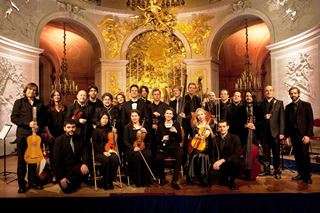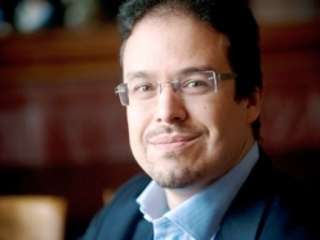|
Back
The Eternal Emotions of Claudio Monteverdi New York
Zankel Hall, Carnegie Hall
02/18/2017 -
Claudio Monteverdi: L’incoronazione di Poppea: “Speranza, tu mi vai”, “Chi parla?”, “Son risoluto insomma” & “Or che Seneca è morto” – Quarto scherzo delle ariose vaghezze: “Sí dolce è’l tormento” – Il ritorno d’Ulisse in patria: “Compagni, udiste?”, “Pastor d’armenti puo” & “Imparate mortali” – Madrigals, Book VIII: “Ardo e scoprir, ahí lasso” & “Altri canti d’amore” – Selva morale e spirituale: “O ciechi, il tanto affaticar, che giova” – Madrigals, Book IV: “Si ch’io vorrei morire” – L’Orfeo: “Orfeo son io” – Madrigals, Book III: “Vattene pur, crudel”
Francesca Aspromonte, Anna Reinhold (Sopranos), Raffaele Pe (Countertenor), Migran Agadzshanyan, Pierre-Antoine Chaumien (Tenors), Renaud Delaigue (Bass)
Cappella Mediterranea, Leonardo García Alarcón (Artistic Director)
Olivier Lexa (Founder and Artistic Director of the Venetian Center for Baroque Music, Stage Director)

Cappella Mediterranea (© Laurent Cools)
”Words become notes, and notes become words.”
Richard Wagner
Wagner, who certainly knew the operas of Claudio Monteverdi, was referring in this case to Don Giovanni. But he could well have referred to the greatest revolutionary in music, Claudio Monteverdi. A revolutionary in jumping over the cloister walls of Church music, escaping obsequiousness towards Royals (though last night he did pay homage to Emperor Ferdinand III) and, in his own words, “building music upon truth.”
Except that “truth” has manifold faces. And when I told a friend last night that I was “emotionally drained” by the Cappella Mediterranea performance of Monteverdi, it was only later that I realized my emotions ran the gamut of all human feelings.
What Music/Artistic Leonardo García Alarcón accomplished had the same audacity as Monteverdi himself in his “Third Practice” toward the end of his life. Maestro Alarcón turned a dozen-odd madrigals, arias, “sung recitatives” and choruses into a kind of opera whose storyline was not a story. It was an opera of Monteverdi emotions.
His seven wondrous singers–with a small ensemble of violins, theorbos, archlute, harp, viola de gamba, harpsichord and organ–entered and exited during each other’s performances. They simulated sexual desire, the desolation of death, the terror of war, the joy of love, and the fun of drunkenness.
None of it parodistic, all with that sense of truth, and the admiration for words which Monteverdi needed so well.
When the four men showed fear and agony as the envious suitors in The Return of Ulysses, their own moods simulated their emotions. When soprano Francesca Aspromonte gives the words that jewels mean nothing compared to inevitable death, one felt Monteverdi’s own innate–and so profound–feelings.
One wonders why Igor Stravinsky admired Monteverdi so much. The Russian composer affirmed that music could offer no feelings outside of music itself. Monteverdi knew that feelings could be accentuated, tuned, brought to the fore with music. Monteverdi, long before Mozart and his librettist Lorenzo da Ponte, used the finest poetry of the late Renaissance, molding the words to bring forth the artist’s formulation of humanity. And while he used the characters of mythology and ancient history, he gave those legends the same reality which Euripides gave to is own dramatic personality of gods and goddesses.
Of course, if some of this singing was “over the top” in our terms, it was simply a way of showing out own moods if those moods were created by a great artists. We can look at the overweening closeups of Eisenstein and Hollywood’s Silent Era, and they can still affect us.
So this artificial opera went through all those emotions. We started with the glorious Ms. Aspromonte in the aria of passion and fear from Poppea (which will be performed in full next Tuesday) followed by a typical piece of torment and love sung Anna Reinhold.
And next came a Monteverdi specialty. What would have been a simple recitative with harpsichord from Poppea became in “Chi parla”, a virtual song, the two tenors giving information, with underlying emotions. This, in Director Alarcón’s “script” was like the knocking at the game in Macbeth, a humorous mood. The same humor as the drunken shepherd in “Pastor d’armenti” from Ulysses.

L. García Alarcón (© Cappella Mediterranea)
This was not your bucolic shepherd from the usual 16th Century theater. Tenor Migran Agadzhanyan, bottle in hand, lurched across the stage, singing and almost burping.
While all the singers were worthy of notice, one must give special credit to Bass Renaud Delaigue for a beautiful solo in the madrigal “Vattene pur, crudel”.
And also to the Cappella Mediterranea consort. We simply don’t know the size of the forces for Monteverdi’s late operas, though they are reputed to be quite large for the time. Mr. Alarcón had an orchestra which was relatively small, but so transparent that one realized how instinctively brilliant Monteverdi was.
In fact, one realized last night that there is no way of “fixing” Monteverdi. Carl Orff’s transcription of Poppea is one of the horrors of the Nazi musical era. He took those so sensitive tones and turned them into Nuremberg Rally fanfares.
Monteverdi didn’t need that. Even five centuries later, his music sings for itself, it still moves us in every possible way. Yes, there was artifice in the Capella Meditteranea singing and playing. The stage direction of Olivier Lexa was artifice, but it still mesmerized us and kept us speculating on what next was to erupt on stage. But such artifice was simply the license of the theater.
And Monteverdi, was we heard last night, had the sheer theatrical and musical greatness of a Verdi, a Puccini, a Berg. Cappella Mediterranea was musically adept, yes. But this was splendor which gave no conept of age, which pierced the emotional events of our own manic present time.
Harry Rolnick
|